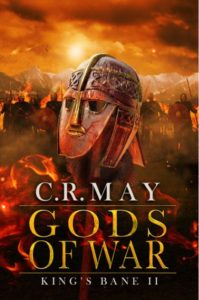If you’re a fan of the TV show, “Vikings” or just enjoy lots of ale drinking, pillaging and cleaving, you’ll enjoy the work of CR May (Cliff, to those of us with his email address.) I first encountered him with “Fire and Steel,” the first book of the King’s Bane series. Book two, “Gods of War” is now available.
Okay, so what’s the CR May story?
I am an English writer of historical fiction, working primarily in the early Middle Ages. One day I was taken aside at work by my boss who told me, ‘foreign

exchange brokers don’t read Archeology Monthly. I don’t want to see you doing it again.’ In a moment of clarity/madness I realised that I agreed, resigned on the spot and never looked back.
I have always had a passion for history, and we moved as a family through a
succession of dilapidated houses which I renovated before selling on to pay off
the bills. These ranged from a Victorian townhouse to a Fourteenth Century hall,
and I learned about medieval oak frame repair, lime plastering and childcare on
the way. I crewed the replica of Captain Cook’s ship, Endeavour, sleeping in a
hammock and sweating in the sails and travelled the world, visiting such historic
sites as the Little Big Horn, Leif Ericson’s Icelandic birthplace and the bullet
scarred walls of Berlin’s Reichstag. Now I write, and Gods of War is my eighth
novel, following on from the success of the first book in the bestselling king’s
bane series, Fire & Steel. (You can see his whole Amazon page here.)
Okay, so you’re way cooler than I will ever be, thanks for that. One very specific question about your book: one of the impressive things about the book (and also something that made it a bit of a tough read) is all the authentic old language in it. How did you come to strike the balance you were happy with (it made it cooler, but also really slowed me down and
often frustrated me by distracting from a ripping adventure story)?
Of course I am aware that a few of the names and terms used in my books are
unfamiliar to some readers, and unfortunately Amazon are not much of a help
here. If the book is downloaded onto an e-reader, it automatically opens at the
start of the first chapter. I always supply a glossary and good quality map in the
front matter of my books, they would be pointless at the end, but unless the
buyer scrolls back before they begin to read, this very useful information will be
lost to them. It’s very frustrating, and quite honestly I don’t know what the
answer is. Really, once a reader knows that an eorle is a hero and a scop a
bard, they will have the knowledge to read any book set in this era. Nobody
would dream of writing captain for centurion, private for legionary or having
Achilles sail a yacht rather than a trireme. Not only would it be anachronistic, it
would look and sound ridiculous.
I realise that I am asking readers to make a little effort at the start, and that it may well cost me sales and the odd bad review, but I hope that most will realise just how much the language adds to the atmosphere of the tale. At the end of the day my ‘writing voice’ is more important to me than wringing every last sale out of a book, but I do hope that most people will make the very small effort required.
Fair enough. What is it about this time period you find so fascinating?
Although historically a ‘Dark Age’, the centuries either side of the year 500AD have always held a fascination for me. At the beginning of this period the Roman
Empire still stretched unbroken from the border of present-day Scotland to
what is now the desert of Iraq. By 600AD that Empire had been swept away
and replaced to a large degree by the countries we see today.
One of those countries was my own, and what a tale it is. It was a time when a strong sword arm could win you a kingdom and a charismatic man could rise from obscurity to found his own dynasty through determination and the luck of the gods. It was, in a way, Europe’s ‘Wild-West’, when land and wealth were up for grabs and even the lowest born could rise to the very top of society.
What is your favorite scene in the new book?
The Ghost Army chapter is a particular favourite. I got the idea from a description in Herodotus’s collection of books from the fifth century BC known as The Histories. In one passage he describes how a nomadic steppe people called
the Scythians would ring the burial mounds of their kings with spectral
horsemen. The image was just too striking not to use, and I ferreted it away
until the opportunity to weave it into a novel presented itself.

It also gave me the chance to put some distance between Eofer, his war band and
ourselves. I always try to treat my characters as human beings like you or I,
essentially identical to the way we are today with all of our strengths and faults,
only lacking the technology we now take for granted. This scene suddenly hits
you, bang, and it is immediately obvious that we dealing with the deep past,
and a religious belief system which is totally alien to us.
If folks want to find you (and they jolly well should), where can they do that?
You can discover more about me and my work on my website: http://cliffordmay.com
All of my books are available on Amazon in e-book and paperback. You can also find my author pages on Goodreads and Facebook.
And on Twitter @cliffordrmay
